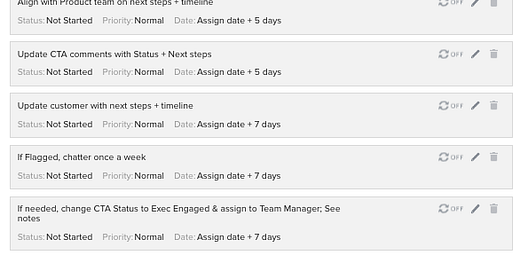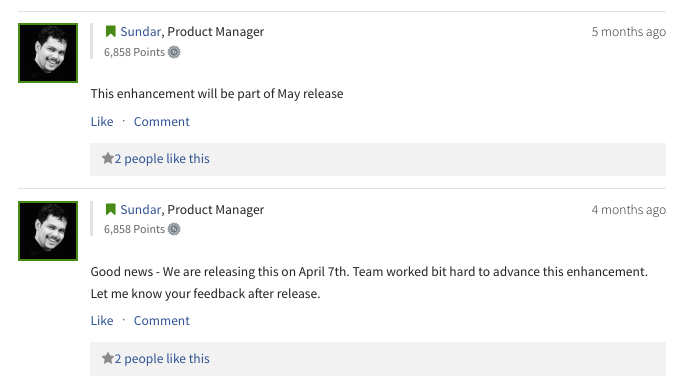Allison Pickens is VP of Customer Success & Business Operations at Gainsight. Special thanks to Gaurav Kotak, Will Robins, and Elena Painter for contributing to this blog post.
Customer Success leaders typically want to collaborate more effectively with other departments in their organization. Even though CS departments are accountable for the renewal rate in many cases, they usually don’t have full control over the attainment of that outcome. They rely on other departments for their role in contributing to outcomes for customers.
CS leaders must align with the Product department in particular to be successful in their roles. Here’s how my CS organization aligns with Product at Gainsight.
Product Risk Process
If you’ve read my blog post on risk management, you’ll know that we track 8 fundamental types of risk in our customer relationships. One of those is Product Risk: when a customer cannot get sufficient value from the product unless an enhancement is made.
When a CSM escalates a Product Risk, this kicks off a formal process outlined in a Product Risk playbook.
We use a new CTA Type called “Product Risk” for these risks and apply a playbook to outline the steps (tasks) for the CSM to carry out. As a result, we can display relevant details about the Product Risk directly within the CTA view.
Product Risks are an effective way to escalate a requested enhancement from a customer. However, it is important to be selective about when to flag a Product Risk. At Gainsight, we only raise a Product Risk when a lack of a feature is causing a customer to receive insufficient value from Gainsight. A risk can only be flagged for Strategic and Enterprise customers; SMB customers must receive an exception from management to create an escalated Product Risk. That said, SMB customers are among our most vocal partners as we improve the product, and we LOVE to gather their feedback in our Community, described below.
Flagging too many Product Risks can result in: (1) a stretched Product team that handles a large volume of risks but doesn’t follow up with any of them with sufficient effort; and/or (2) a Product team that dedicates too little time to break-through innovation. That said, we usually see Customer Success teams flagging too few risks to their Product teams, not too many.
Our Product team also aspires to proactively learn about customers’ needs and incorporate them into the product planning process. Here is how the Customer Success team works with Product team to achieve this:
Community
It is impossible for our Product team to engage one-on-one with every client. Our online Community allows us to gather feedback from our customers at scale. Customers post their ideas to Community, and our Product team responds directly to their posts to learn more.
Gathering product enhancement requests on Community enables us to analyze the requests that are common to many customers. Community participants can “upvote” product ideas; enhancement requests that appear most often or that have the most “upvotes” are prioritized on the product roadmap.
On Community, the Product team can easily engage with customers to better understand their requirements and provide features that align perfectly. Over the past 6 months, Product Managers and CSMs have participated in 91% of the posts on Community. Most posts are responded to within 48 hours.
On a monthly basis, the Product team leaders review and update the product roadmap. Team members ensure that customers are regularly updated regarding their requests via Community.
If you haven’t signed up on Community yet, do that here!
Themes from CSMs
Our Product team can gather detailed information on customer requirements from 1-on-1 conversations and Community. But our CSMs can also help the Product folks identify themes across customers, given that CSMs are interacting with customers all day, every day. Moreover, customers may be willing to share sensitive feedback with the CSM that they would not share publicly on our Community. (We’d still encourage you to share it on Community, though!)
As a result, our Product team organizes a monthly meeting for CSMs to share their observations about patterns across customers’ use of Gainsight.
Themes from Support
Our Support team interacts with our customers everyday too, and often have valuable perspectives on features requested through Support tickets. Although the Support team encourages all customers to voice their requests via Community, the Product team holds a bi-weekly meeting for Support to discuss broad themes.
SME Program
We want to make sure that Gainsters with a variety of perspectives offer feedback on the product. For example, while a CSM might lend an interesting perspective on the usability of Gainsight for end users, a Solutions Architect might have a perspective specific to the configurability of Gainsight for an admin.
Our Subject Matter Expert (SME) program connects our Product sub-teams, each of which focuses on a different part of the product, with people across different roles in our Customer Success organization. Each SME team meets once every two months, with the following agenda:
Product Feature Update (20 minutes): Overview of trending usage stats, recently released enhancements/functionality and bug fixes
SME Examples (20 minutes): Review of challenges faced by customers related to a feature, and proposed solutions
Feedback on Roadmap: Review the upcoming roadmap and reprioritize, add or remove proposed features based on SME feedback
Sometimes, if we strike on a very juicy subject, we hold a follow-up meeting with certain SMEs and Product Managers to deep dive on specific issues.
If you’d like to learn more about how to implement Business Processes in your organization, check the Business Processes section of Gainsight Go, check out the Vault (with over 250+ ready to import Playbooks, Email Templates, Surveys and Rules), pose a question on Community, or contact your CSM. Follow Allison’s blog posts on Twitter at @PickensAllison.




